Joss Whedon is standing in the Forbidden Planet comics store in London, surveying a row of plastic action figures. There are Gandalfs and Frodos, Batmen and Ironmen. Whedon points out the few female characters – pert young warrior princesses – all standing in the same pose: shoulders back, cleavage thrust forward. This, he explains, is the reason he resisted a Buffy doll.
Until last year, Whedon was a writer and director best known for his TV creations. Buffy The Vampire Slayer and its spin-off, Angel, were cult classics, the just-home-from-school fantasy shows that made vampires sexy long before R-Patz and Kristen mooned at each other in Twilight. Then Marvel handed him the biggest toy set they had: Avengers Assemble, a film that trapped their greatest superheroes in one megalithic, extortionately expensive movie. Thor!… Hulk!… Captain America!… Robert Downey Jr! It came with a price tag of no less than $220m; Whedon turned it into the third highest-grossing movie of all time. "I kept telling my mom that reading comic books would pay off," he deadpans.
Whedon makes a pilgrimage to Forbidden Planet whenever he comes to London. He might be the Hollywood director responsible for the most successful film of 2012 – he may have a house in Beverly Hills, and Scarlett Johansson on speed-dial – but the creator of Buffy is still very much a fanboy. Like JJ Abrams, who now controls the parallel universes of Star Trek and Star Wars, Whedon is proof that the geek can inherit the earth. In fact, before Avengers came along, Whedon was worried that the zeitgeist had overtaken him. "When Sam Raimi made Spider-Man, I was like – gah, I wanted to be the guy who got it right! When I saw The Dark Knight I was like, Oh, now it's postmodern… They're doing the superhero Godfather! So I guess it's over and I didn't get to make one…"
For a certain type of entertainment fan – for example, me – Whedon's arrival in the mainstream (last year also brought The Cabin in the Woods – a clever meta-horror flick) is particularly satisfying. Even if you don't care for vampires and werewolves, he can make you laugh. If you enjoyed Toy Story, chances are you were laughing at the brilliant repartee he wrote for it; if you followed the US election on Twitter, you probably saw his home-made ad, endorsing Romney as the only candidate who could bring about the zombie apocalypse. But Whedon's genius is never going to be the kind recognised by the "serious" awards – at last year's Oscars, Seth MacFarlane told the audience, "The Avengers was the most popular movie of the year… which is why it was only nominated once." Whedon shrugs off the snub. "If you make a movie where you're just trying to delight people, and you want them to come out overjoyed, then… you're fucked."
So meeting him is the ultimate geekout. He has a russet beard, a dress-down look, and kind-dad eyes, and is every bit as genial and funny as his on-screen creations. When we meet up in the morning he is making himself coffee in his hotel room. "I have an obligation to do press, but I don't have an obligation to stay out dancing until 3am," he says, guiltily. Tom Lenk, one of the actors who works with him regularly, has told me that they share a passion for disco, although I can't quite picture Whedon throwing shapes. But then I also can't imagine him facing down an intimidating and costly constellation of stars (including Samuel L Jackson and Gwyneth Paltrow) and their egos. "I had one bad week where some people lost confidence in me," he admits. "But I told them to shut up and got on with my work."
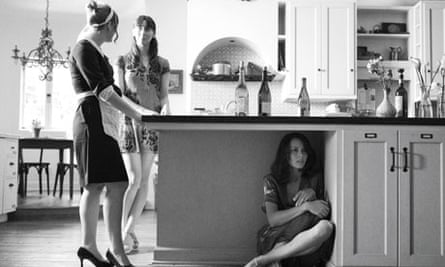
While his Avengers sequel begins the colossal task of assembling itself – it is not scheduled to reach cinemas until 2015 – Whedon's new directing project, Much Ado About Nothing, seems like the most contrary project he could have conjured: a black-and-white chamberpiece, shot in 12 days entirely in Whedon's own house. And yet, as the play for which Shakespeare reserved his pithiest dialogue, it is also utterly appropriate for a man who has spent a career crafting zinging one-liners. Whedon nods in agreement. "Somebody came up to me and said, this must be so different from the Avengers! And I said it's really not. Except that I'm happier because I'm at home surrounded by my loved ones…"
Whedon's Much Ado had its genesis in the Shakespeare readings he began hosting at his home over a decade ago. While shooting Buffy, James Marsters – well-known to fans as the dastardly vampire Spike – had mentioned how filming had started to feel like rep theatre, and Whedon, who as a child had read out plays with his family during the holiday season, was inspired to invite his actors to his house to tackle everything from A Midsummer Night's Dream to Hamlet. Then he had children. "They put a stop to everything," he says. "'You like playing music? Oh, I like to yell…'"
Meanwhile Whedon's wife Kai, an architect, had built them a home in Beverly Hills with artistic endeavour firmly in mind (she even incorporated an outdoor amphitheatre). The idea of shooting Much Ado there took hold – it is the only Shakespeare play set on a single estate – and when his Avengers contract demanded an enforced week-long break between filming and editing, Kai told him: "It's time."
As well as shooting in their own house, they funded the production themselves. "I did everything they say don't do," Whedon grins. "Great idea to shoot next to a golf course, by the way. You know what they do on golf courses all day? Mow." His cast consisted of regulars from his TV shows, who gave their time "for what will ultimately be dozens of dollars". The result is a truly intimate, ensemble Much Ado – one in which every character has his own triumph and tragedy, rather than revolving, as so many productions do, around the bickering flirtation of Benedick and Beatrice. "If you've ever engaged in an endeavour that made you feel you were doing something right, you felt what we were feeling," says Nathan Fillion, the star of Castle, who plays the part of Dogberry. "I have no idea what that man sees or how his brain works. I imagine a switch in his head in the 'brilliant' position with the handle broken off. Fortunately, the 'awesome' switch next to it is in the same condition."
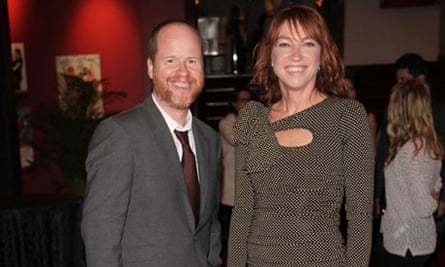
For Whedon, Shakespeare's "inspired ADD" was the key. "He's such a passionate writer, he leaves nothing on the floor. He loves even the smallest parts. And he's not afraid to completely switch genres, from 20 minutes of high drama to some of the lowest comedy you can imagine, something I love to do in my own work. Of course, comparing yourself to Shakespeare is the quickest way to make people hate you…" He breaks off. "I actually did write a song called the 'Ballad of How I'm Like Shakespeare' years ago. But that was after they discovered that there were traces of marijuana in his pipe."
Whedon grew up in New York, a small, shy child with two older brothers who were "bigger and meaner". He found solace in the world of comic books. "This idea of helplessness is appalling to me, so I would write characters who could do things," he says, adding almost in a whisper, "because I was not one of them."
Both his grandfather and father were TV screenwriters, so one imagines that TV was an elevated artform in his home. "Nope! My father and mother divorced when I was about eight and my mother had had quite enough of that." Whedon was only allowed to watch BBC shows, so he consumed a diet of Masterpiece theatre and Monty Python. "To be honest," he says, "I was a little bit ashamed of American TV because I thought, 'None of the shows my father works on are as funny as my father.'" When his mother, a history teacher, took a sabbatical in the UK, Whedon enrolled at Winchester College, where his ability to quote Python came in useful for making friends.
His career began on the TV show Roseanne. Writing for Hollywood is, he says, a "brutal, soul-crushing" experience. "I've described it to students as like climbing to the top of the mountain and finding out it's surrounded by more mountains and there's no view at all." Actors mangled his lines, directors and producers rewrote entire scripts. "You have to be Prometheus and have your heart removed every day."
Whedon's first Buffy the Vampire Slayer script was made into a film – and was an inauspicious first outing for the character, although it has a stellar cast: alongside Donald Sutherland and Rutger Hauer, there were early 90s performances by Hilary Swank and Luke Perry, and uncredited appearances from Ben Affleck and Ricki Lake. But it was the springboard for Whedon to create his own universe: supernatural and sci-fi worlds populated by fast-talking, wise-cracking folk whose language has infiltrated our speech (if you find your vocab becoming rather suffix-y – if you've ever used words like "backstabby" or "kissage" – thank Whedon).
As well as Buffy and Angel there was a short-lived but much-loved space-western called Firefly, and a futuristic mystery called Dollhouse, starring Eliza Dushku as a neurologically programmed assassin. I tell Whedon it seems that he was always ahead of the curve ("and I believe that's what you should print!") – he was creating "box-set" TV with multi-series arcs before DVDs were even in shops, and his online musical, Dr Horrible's Sing-a-Long Blog, pre-empted the arrival of web-commissioned comedy like Arrested Development.
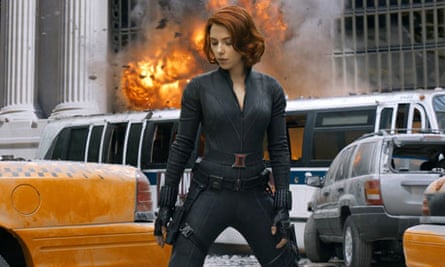
What you can't miss about his oeuvre is its empowering depiction of women. Buffy, with her kickass reflexes and witty rejoinders, never needed rescuing by a guy – hell, she once stuck a sword through her boyfriend's chest. Was it hard, I wonder, to introduce a feminist icon into fantasy, a genre more associated with teenage boys with limited social skills? "It's like horror or, back when it was somewhat new, rap," Whedon replies. "It's a fringe art which means you will find the most egregious misogyny in there – but also the most subversive feminism."
Whedon has said before that if anyone wonders why he writes female characters the way he does, they need only meet his mother. Writing a female hero was a conscious decision "but if it doesn't come from the subconscious it'll just be a polemic, it'll reek," he says. "There's nothing worse than someone who thinks they're supposed to add a feminist or racial agenda that they're not invested in." Whedon himself was inspired by James Cameron – "He gave us [Alien's] Ripley and [The Terminator's] Sarah Connor when we desperately needed them, and he wasn't doing it with any stated agenda."
He admits, however, that the status quo may not have improved dramatically. He's keen not to lay a thick judgment on the Twilight franchise, but he admits the films "feel like a reaction against Buffy: 'OK, we liked the part where it was sexy, and there were love triangles, and monsters… We found her a bit grating.'
"Kristen Stewart is kind of captivating," he continues, "she can just stare at stuff and it works because I still want to watch it. But it does seem a bit passive. 'I don't know which beautiful boy to choose between!' is not exactly the struggle that every girl is going through."
It is a telling observation: Whedon caused controversy and plaudits in equal measure when, in a Buffy comic book he created after the TV series, he had his Chosen One get drunk at a party, become pregnant and seek an abortion. For Whedon, heroism is about "helping someone else become stronger". He tells me about one of his favourite memories – at a carnival, watching a girl on a ride as she transformed from complete terror to laughter and enjoyment. "I came off the ride, like, weak at the knees – 'I just watched somebody grow up.'"
Ever obliging, he heads off to sign some merchandise. I think back to my own Buffy years, and the thrill I had from watching a young woman, the same age as me, learning to hone her abilities, saving the world one vamp at a time. I want to thank him, but as he shakes my hand, he squeezes my arm and gives me a smile that tells me he understands. He's a geek, too.
Much Ado About Nothing is in cinemas from 14 June
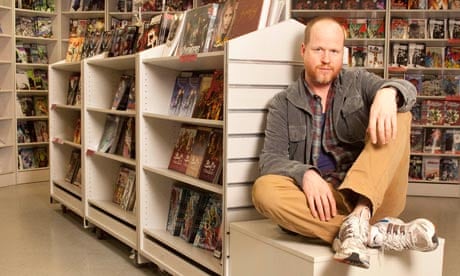
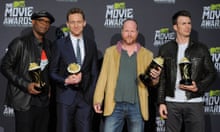
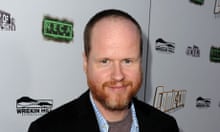
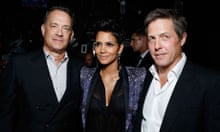
Comments (…)
Sign in or create your Guardian account to join the discussion